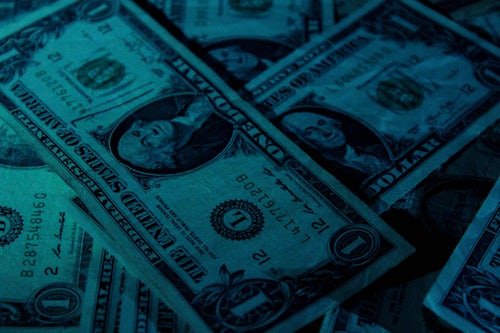Going Cashless and Becoming the Product
"Gee, I sure hope none of these people in this line decide to pay with cash" is something no one ever says. Despite what the marketing materials for credit cards might state, cash is still usually the faster payment option in my experience. In fact, when I am waiting for a slow customer to get out of my way because I want to buy gas or rolling papers, it is usually some card issue that causes the delay. Switching gears, I read a post recently (I will drop a link at the end of this post) about the move to a cashless society. The author made some excellent points (that I don't want to rehash here) and the topic stuck in my mind. There are quite a few drawbacks to not using cash and many of them are not apparent on the surface. There is, I believe, an agenda behind the push to abandon cash and, not surprisingly, it seems to serve to leave us more open to exploitation and abuse by the powerful and the authorities.
On the surface, the drive to move away from cash based transactions is framed as though it is being done for the convenience of the customer. I can recall five or six commercials from the past few years that try to present a false reality in which cash is inconvenient and credit cards are "better". However, that isn't how things seem to play out in the real world. As I mentioned above, using a card can be pretty slow under the right circumstances and, even in good conditions, they are no different from cash in terms of the speed of the transaction. In short, this is a lie.

Dishonesty in advertising, of course, is nothing new but there seems to be more at work in this issue because cashless payment options do have some marketable features that don't require lies about being "better than cash". To state that more simply, credit cards are not that hard to sell which makes me wonder why cash would be targeted for a campaign of slander. To me, the real goal of this type of advertising is to normalize and justify living a cashless life to the audience. It is, in my opinion, the idea and not the product that is being sold us. Marketers know that if they say a thing often enough it will become "true" in the minds of some percentage of the people who see their material. Before long, those individuals begin to desire cash less and traceable options more.
That covers the some of "how" but what about the "why?" The post that I referenced earlier (link below), in part, takes a look at the financial and control sides of this issue, so I will not cover those things but I do believe that they play a large part in this. At any rate, paying with a credit card or many of the other cashless methods leaves a record of our commerce and that is very valuable to a number of people, corporations, and systems of authority who do not have our best interest at heart. This will be my focus.
Let's take a look at the least "tinfoil-hat-ish" of the the potential uses for our buying data. By using some non-cash payment method, both the seller and the issuer of the card (or whatever) can identify who the buyer is and what items that he or she bought. Think about what this means for a marketing department. They can have personalized data on every single customer. They would no longer need to settle for advertising to broad demographics because they could target each individual with the products and services that he or she is likely to buy or use. Some companies are already doing this openly and few seem to be unnerved by it. Famously, it came out that Target was able to identify which of its customer were pregnant (I will link to that story below too). Now think about what that information is worth to third parties. I can't put a hard number on it but I suspect that it is no small sum. By moving to a cashless society, we allow those who would gather our information greater access to our lives which makes it easier for them to earn money off of us twice; once as a customer and again as the "product." Sure, there is likely some "privacy policy" that supposedly prevents this type of behavior but there is almost always a way around those things and when there is none, there is often no hesitation to simply violate the policy without the customer's knowledge or consent.
There is more that our purchasing records can be used for but those things may stray into "conspiracy" territory. We know, as a fact, that law enforcement and the courts often work with banks, credit card companies, and even retailers during the course of investigations of various crimes. This, in itself, is not worrisome. I don't particularly care when some murderer is caught because he or she was dumb enough to buy all of the murdering tools with his or her personal credit card but this shows that there is a close association between the authorities and the entities who keep records of our buying habits. If something can be exploited it will be exploited (I believe, anyway) and when one applies this to the issue at hand, things can get a little scary. Imagine that someone vocally opposes the authority and that the authority wants to discredit this person. How long would it take before it decide to use its connections to get a hold of that person's buying history? My guess is that this would be one of the first actions taken against someone who is being targeted. There is "dirt" that could potentially be found and it could be "leaked." A married man spent a lot on dinners and bought condoms which could raise questions about infidelity and ruin his image even if he was righteous in his cause. A champion of the poor spends too much on some frivolous thing which could make this person appear like a hypocrite even if his or her vision never conflicted with his or her personal desires. I could go on but the point is that information about the things that we buy can be weaponized against us.
I could be wrong, of course, but I feel like there is something here. We have seen light shine on all manner of unethical activities by the governments, the powerful, and the wealthy who run the systems under which we live. That being the case, I think that we have reason to be suspicious of the things that they really seem to want us to do. They feed on us, they thrive of our labor, and that is easier when we are blind to their real goals which makes things like this suspect in my mind.
Peace.
These are the articles that I mentioned in this post:
https://steemit.com/money/@krnel/the-push-towards-a-cashless-controlled-society
All the images in this post are sourced from the free image website, unsplash.com.
.jfif)
.jfif)

You are absolutely correct regarding the use of our purchasing history for all manner of marketing and monitoring. If they do it on Google, Facebook, and Amazon, why wouldn't they do it with credit cards?
The hilarious thing to me is that if they really wanted to make a secure, convenient product for people they could. Instead, they retrofit the card readers with chip readers but fail to give them enough processing power, causing massive delays. Imagine trying to quantify the amount of time wasted by these chip readers... Say 5 seconds per transaction. But it isn't just your time, it is all the people behind you in line. And then they come up and do the same thing. A 5 person line would actually waste 25 seconds per transaction. Terribly inefficient and a huge lack of respect for the users.
You have good points. The main problem I have with cards is that you're basically signing off your money to another entity that you trust to deliver the money whenever you use the card. What if, say, a big disaster happens and people are left without electricity and/or Internet? We're fucked, even if only temporarily. What if they just decide to say "no"? What if an accident, or "accident" happens and your account's data/balance is lost? Those situatoins may not be very likely, but they're worth considering and they aren't a problem at all with cash. The only thing you have to worry about with cash is getting robbed, and at least then you have a fighting chance.
It's the same way with streaming music. I'm reluctant to use services like Spotify, Amazon Music, Amazon Video, etc. You no longer own the product; you pay for the right to be served the product on demand as long as the service is running and functional. I buy/download music and movies whenever possible, so if anything were to happen to my Internet access or to those streaming services, I'd still have the media as long as I have electricity.
Great work as always, sure is spooky to have Big Brother always looking over your shoulder. I'm sure the purchase histories of a lot of powerful people could be quite embarrassing too, which may make them hesitant to open that can of worms.
Truth. That is probably how it goes. I imagine some senator (I picture Ted Cruz for some reason) knows that Master Card knows that he ordered a Real Doll that looks suspiciously like his mother or something and he isn't going to want to piss them off by voting for something that goes against their interest and risk that coming out.
Great article! Quite sad a lot of people fall for this false advertising of "cashless convenience". So far it has never been convenient to wait in line to verify the shopper's info and signature. And also you are right, we are letting the CC companies totally own us by going cashless.
Thank you. Yeah it kind of worries me but few seem to notice.
Curated for #informationwar (by @openparadigm)
Our purpose is to encourage posts discussing Information War, Propaganda, Disinformation and other false narratives. We currently have over 7,500 Steem Power and 20+ people following the curation trail to support our mission.
Join our discord and chat with 200+ fellow Informationwar Activists.
Join our brand new reddit! and start sharing your Steemit posts directly to The_IW!
Connect with fellow Informationwar writers in our Roll Call! InformationWar - Contributing Writers/Supporters: Roll Call Pt 10
Ways you can help the @informationwar
Thank you.